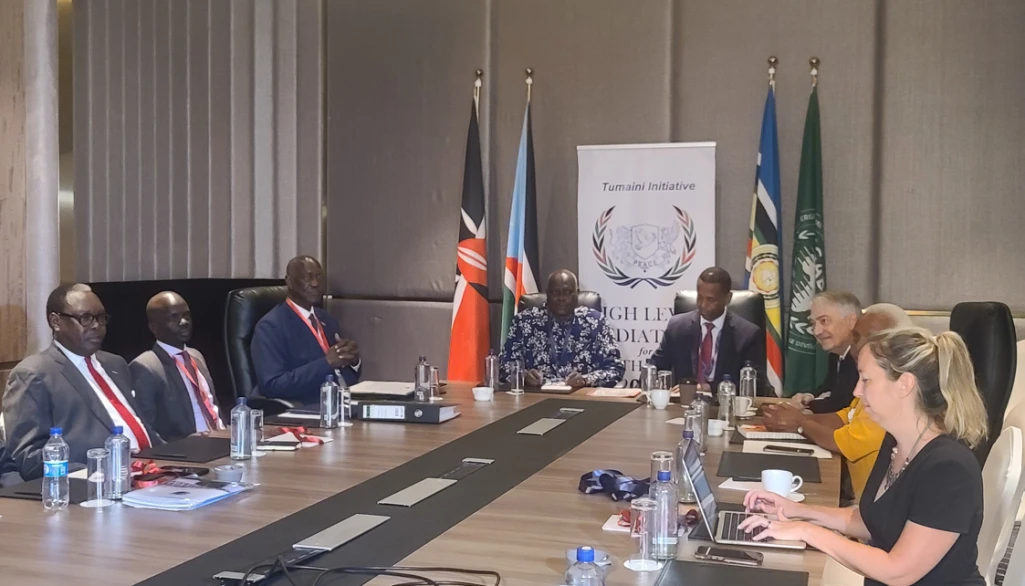
The government pushed for renegotiation, and the opposition firmly opposed the proposal, fueling a contentious dispute.
The government delegation, led by Senior Presidential Advisor Kuol Mayang Juuk, arrived at the talks' venue and met with the mediation team for consultations before the negotiation resumed.
Despite the delay in coming back to the talks as scheduled, Kuol expressed a renewed commitment to achieving peace, as the talks were set to resume.
“I am telling our people, the viewers, that we are serious. We want to discuss this with these people. And if they are serious, then we will make peace,” Kuol stated on Saturday before leaving for Nairobi for talks resumption.
“We need peace. Our country needs peace. Everyone needs peace. That is why President Salva Kiir appointed me to lead this team.”
After hitting the deadlock in December 2024 over the previously agreed-upon protocols, the discussions were adjourned and rescheduled for January 6th.
However, the government delegation delayed and was unable to arrive at the venue for the resumption of the talks on January 6, leading the opposition and citizens to express concerns about the government's commitment to the peace process.
The government delegation arrived in Nairobi on January 18 for talks resumption.
“We hope that we will reach an agreement,” Kuol stated.
For his part, the Secretary General of the opposition's United People Alliance, Lual Dau, also expressed optimism that they will approach the next round of talks with the burden of South Sudanese suffering in their hearts.
He emphasized the importance of engaging with the government in a spirit of unity and purpose to achieve the long-awaited consensus.
“This is our country, and we will come with an open mind and listen to their views. We share our views, and I'm sure this time, this round will be successful,” said Lual.
Civil society activist Edmund Yakani also urged the parties to ensure the success of this round of talks.
“This round of mediation is real exposure of South Sudanese political elites before the citizens and the regional and international community if they are really committed to peace and stability,” Yakani said.
“CEPO is urging with high respect and honor for the president and the leadership of the opposition groups to take serious responsibility for making this round of Tumaini Peace Talks succeed without any dragging of feet or failure.”
The Tumaini initiative, launched on May 9, 2024, aims to achieve lasting peace in South Sudan by incorporating opposition parties that did not sign the 2018 peace agreement.
However, two months after its launch, the talks stalled due to divisions within the government delegation following the SPLM-IO's withdrawal. The peace talks resumed in December 2024 after the government unified its position.
Despite the president's directive to conclude the talks within two weeks, the parties failed to reach an agreement and hit another deadlock, which is yet to be resolved over previously initialed protocols.
For many South Sudanese, the Tumaini Initiative represents the last opportunity to resolve the nation’s long-standing conflicts.
"We the citizens express optimism about the Tumaini Initiative, viewing it as a crucial step towards achieving lasting peace in South Sudan. I personally believe that including opposition parties that did not sign the 2018 agreement is essential for a comprehensive resolution to the conflict,” said Aguek Mayot from Warrap State.
Jacob Mawut Deng, a resident of Jonglei State, added, “If they sign peace, it will end road ambushes and cattle raiding, and all the rebels will join the government in Juba to develop their own country.”
The parties were set to move to the next protocol on responsibility sharing after initialing eight protocols, but the new government delegation requested renegotiation of the eight protocols before proceeding to power-sharing discussions.
The opposition rejected this, leading to an impasse that is expected to be resolved with the resumption of talks.